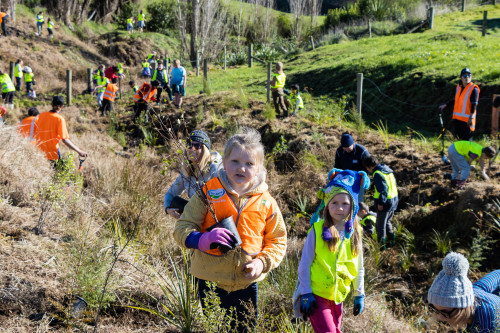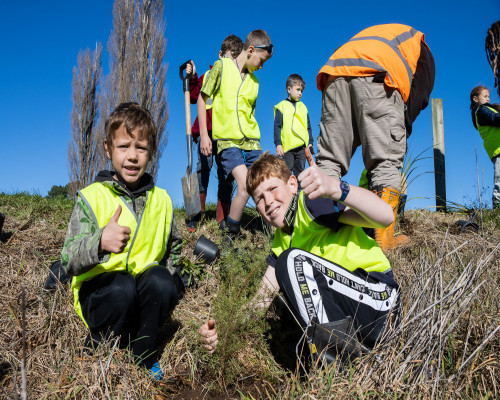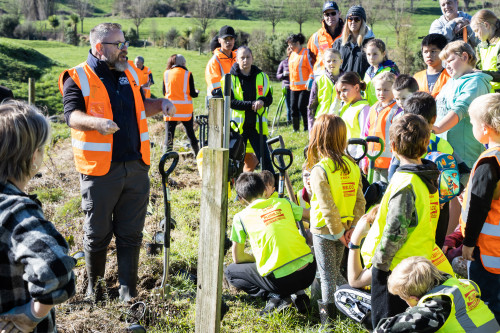Te Poi School digs in with shovel ready restoration project
| Published: | 07/07/2021 |
It takes a community to improve a catchment, as evidenced at a planting day for a Waikato Regional Council shovel ready project.
Te Poi School students, teachers and families planted 500 plants in a wetland on a neighbouring farm as part of the Upper Waiomou Stream restoration project which has $1.74m in funding from the Jobs for Nature programme and $74,500 from Fonterra’s environmental partnerships programme.
The Upper Waiomou Stream restoration project is one of 17 shovel ready projects which Waikato Regional Council got government funding for in the wake of COVID-19 to stimulate the construction and environmental industries and economy, be of public or regional benefit, and create jobs.
The project is about removing and managing overgrown willow and poplar trees along the upper Waiomou Stream and tributaries Rapurapu Stream and Tukutapere Stream, which are causing the banks to erode, and planting a native corridor instead.
Over four years, 48 kilometres of riparian margin will be retired and planted out (128,000 native plants). The council is currently working with seven landowners to deliver year one of this project.
Te Poi School principal Linda Larsen said the Enviroschool had been planting wetlands on the farm since 2013.
“A lot of the kids come from farming families, and they will be the farmers here in the future. Supporting any one programme builds movement in the rest of the community, and benefits everyone. The planting we’re doing is normalising that for them.”
Upper Waiomou Stream project leader Aniwa Tawa told the students: “Little by little, with riparian planting being done up in the Kaimai Range and in the Hauraki Plains, we’re creating one big corridor from the mountains to the sea, improving habitat and water quality.”
The willow and pest plant clearing, preparation of riparian margins and planting is being done by Wairere Mahi Ltd, a local labour hire crew started by Ngāti Hinerangi and born out of the effects of the COVID-19 lockdown.
Site manager Tim Aoake said a team of up to 13 had been working on the Upper Waiomou Stream project.
“Reconnecting with the land is the biggest thing for us. Water is our life source, so we try to make it better for everyone. This is our awa, this is what we are doing to improve it, and then we pass it on to the next generation to carry on with this work.”
Fonterra Regional Head Waikato Debra Kells said catchment restoration was accelerated by connecting and empowering farmers, communities and businesses to achieve their environmental aspirations.
“Through our Sustainable Catchments programme, we fund work that has wide benefits to a catchment but is beyond the scale of individual farmers.”
Jobs for Nature is a $1.219 billion programme that manages funding across multiple government agencies to benefit the environment, people and the regions.
To find out more about the council’s Upper Waiomou Stream restoration project and the other projects it received shovel ready funding for go to www.waikatoregion.govt.nz/shovel-ready.





To ask for help or report a problem, contact us
Tell us how we can improve the information on this page. (optional)